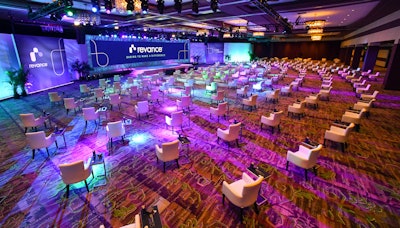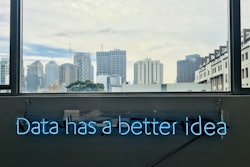
As hotels, convention centers, and other event venues begin the cautious process of reopening, expect to see some pretty drastic changes. Here, venues throughout North America discuss their enhanced cleanliness protocols, contract revisions, ways they’re accommodating the all-important hybrid event, and more.
Cleanliness Is Key
According to a survey of 38,000 hotel guests, released by J.D. Power in July, safety protocols are the single most important things to communicate to guests prior to arrival. Major hotel chains such as Hilton have gone so far as to market comprehensive plans specifically centered around meetings and events; the global hotel
chain has introduced the Hilton EventReady with CleanStay
program, which dives into catering protocol, meeting layouts, and environmental impact.
 Hilton’s new EventReady program focuses on safe practices for meetings and events, specifically surrounding room layouts, catering, environmental impact, and more.Photo: Courtesy of Hilton
Hilton’s new EventReady program focuses on safe practices for meetings and events, specifically surrounding room layouts, catering, environmental impact, and more.Photo: Courtesy of Hilton
Other event venues are also rolling out thoughtful plans. The Roof at Ponce City Market in Atlanta—which encompasses a 23,000-square-foot outdoor space, 9,000 square feet inside, and more—reviewed recommendations from the CDC and medical professionals before introducing new guidelines. For example, the restaurant portion is only allowing 10 patrons per 500 square feet inside the dining room, while games and mini golf are limited to one party at a time. “We also carefully review floor plans created by planners and other vendors who utilize our event space to make sure that they allow for a safe event,” says Chris Eldridge, the venue’s vice president of sales and marketing.
Pinstack Austin—a 50,000-square-foot entertainment venue and restaurant in Austin that debuted in February 2020—has also thoroughly revamped its event offerings. In terms of catering, each event receives a dedicated server (who has undergone thorough training and is wearing a mask) to distribute individually wrapped food along with single-use menus, napkins, and utensils. Venue capacity is limited, tables have been reconfigured, and bowling is restricted to every other lane. Shelly Prowell, director of sales for Pinstack Austin, says, “Our team’s combined years of experience in this industry was valuable in really digging deep and understanding what would make us feel safe in a group environment during this time.”
 Last June, the 4-million-square-foot Georgia World Congress Center in Atlanta became the first venue to receive the GBAC STAR accreditation.Photo: Courtesy of Georgia World Congress Center
Last June, the 4-million-square-foot Georgia World Congress Center in Atlanta became the first venue to receive the GBAC STAR accreditation.Photo: Courtesy of Georgia World Congress Center
To take it even further, many venues are working toward GBAC STAR accreditation—the new gold standard in the COVID-19 era. The GBAC STAR program, created by the Global Biorisk Advisory Council, provides best practices for preparing and responding to infectious diseases and biohazards. In June, the 4-million-square-foot Georgia World Congress Center in Atlanta became the first venue to receive the accreditation, and many more event venues have either achieved it or announced commitments toward it.
Beyond the Dotted Line
With local regulations constantly in flux, venue contract flexibility is top of mind for event organizers. Recognizing this, Hilton’s EventReady program offers flexible pricing, flexibility with space options, and simplified contracts. “We have to be responsive to the needs of the customers right now,” says Passanante. “We realized that customers need language in their agreements that addresses some of the issues of today. We’ve also created a simplified agreement for small meetings that really streamlines the booking process.”
Eldridge also recognizes that planners need a bit more flexibility right now. “We listen to our clients’ needs and try to make adjustments based on that information,” he says, noting that The Roof at Ponce City Market has begun allowing event deposits of 25%, rather than the standard 50%.
 LG Business Solutions’ new wellness kiosks aim to limit unnecessary interaction between attendees and staff.Photo: Courtesy of LG Business Solutions
LG Business Solutions’ new wellness kiosks aim to limit unnecessary interaction between attendees and staff.Photo: Courtesy of LG Business Solutions
Venues are also using technology to cut down on physical contact between staff and attendees. For example, the 220-room Hyatt Centric Downtown Portland is using a custom app to allow for scheduling housekeeping, contactless check-in, and more.
Restaurants, meanwhile, are offering digital menus via QR codes,
plus a ban on cash payments. Another great option for venues is LG Business Solutions’ new wellness kiosks, which include a thermal scanner for temperature readings and a motion-activation hand sanitizer dispenser; the displays can also track when attendees enter and exit an event—reducing the need for check-in staff—and details on bathroom occupancy and cleaning status.
 Canada’s Palais Des Congrès de Montréal is hosting
Canada’s Palais Des Congrès de Montréal is hosting
hybrid events with partners Encore and GES.Photo: Courtesy of Palais Des Congrès de Montréal
Another essential use of technology in the COVID-19 world? Hybrid events, which include a small group in person but a larger group virtually. Properties like Convene’s event venues and flexible office spaces, plus the Palais des Congrès de Montréal convention center, have established dedicated teams focused on hybrid events. Lytehouse Studio in Brooklyn, N.Y., is fusing live and virtual audiences with a 360-degree, immersive cyclorama stage, plus high-speed livestreaming options, professional lighting packages, and more.
The team at The Roof is also adding virtual options, particularly in a meeting room Eldridge affectionately calls the “Zoom Room,” where event hosts can join virtual guests for a happy hour. For weddings, the venue can even send virtual guests a bottle of Champagne to make them feel included.  Lytehouse Studio in Brooklyn, N.Y., is fusing live and virtual audiences with a 360-degree, immersive cyclorama stage, plus high-speed livestreaming options, professional lighting packages, and more.Photo: Courtesy of Lytehouse Studio
Lytehouse Studio in Brooklyn, N.Y., is fusing live and virtual audiences with a 360-degree, immersive cyclorama stage, plus high-speed livestreaming options, professional lighting packages, and more.Photo: Courtesy of Lytehouse Studio
Thinking Outside the Box
One upside to new restrictions? Smaller guest lists can allow for a wider list of venue options, notes the team at JW Marriott Marco Island in Florida, which has seen significant demand for outdoor events that allow greater flexibility in designs and floor plans. Eldridge notices a similar trend at The Roof. “Areas that were previously considered to be too small for [an event] are getting a lot of interest,” he notes.
One of the more headline-grabbing ways venues are keeping guests safe right now is through creative social distancing. Virginia’s famed The Inn at Little Washington uses life-size mannequins to keep diners from sitting too close together. And prior to increased restrictions, Lady Byrd Cafe in Los Angeles had transformed its parking lot with private glass cabins filled with plants and herbs. Meanwhile, Pinstack Austin is offering socially distanced team-building games—such as Family Feud, mask decorating, and more. “We brainstormed with a professional facilitator, and together we came up with fun ideas that allowed for social distancing but still keep the team-building spirit intact,” explains Prowell.
And The Roof has created a photo booth that separates two guests via plexiglass, allowing them to safely take photos together. (The booth is sanitized between uses.) “This is the time to go the extra mile for clients and show them that you care—for example, we hand every guest a miniature hand sanitizer at every event,” says Eldridge. “Live events are only changing, not going away. People are still eager to interact in a safe way.”
A version of this story appeared in the fall 2020 issue of BizBash.



















